Politics
German government descends into crisis mode
Published
6 months agoon
By
Ekwutos Blog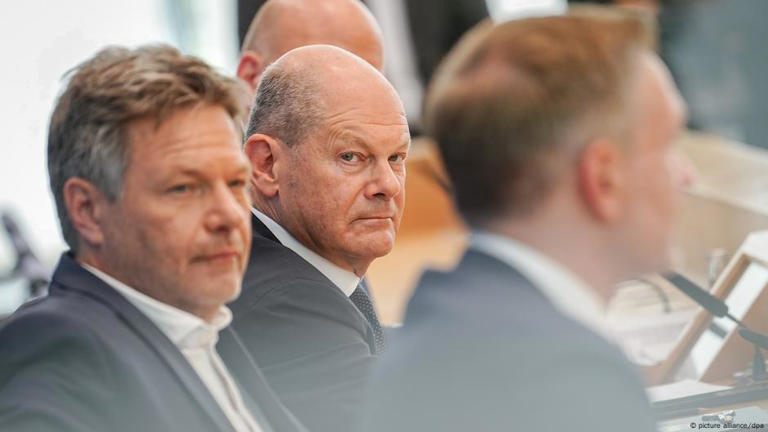
German government descends into crisis mode
Chancellor Olaf Scholz is trying to hold his coalition government together. But the three partners, SPD, Greens and FDP, seem unable to stop the infighting, although they depend on each other to stay in power.
Give up or rescue what can still be saved? This is the choice faced by the center-left government of Social Democrats (SPD), Greens and neoliberal Free Democrats (FDP) which has been in office for almost three years. The three parties have always been at loggerheads because many of their core policies are substantially different: The SPD and Greens believe in strong state and debt-financed policies. The FDP takes the opposite view.
Initial common ground was quickly exhausted. The give and take that is necessary for a coalition is now becoming increasingly difficult.
The situation has recently escalated around economic and budgetary policy. A ruling by the Federal Constitutional Court around a year agoexposed the rifts between the coalition partners. Back then, Germany’s highest court ruled against the government’s plans to reallocate money earmarked but never spent from a cache of debt taken out to mitigate the fallout of the COVID-19 pandemic. The money was instead earmarked for the government’s climate action budget. The court ruling left the budget €60 billion ($65 bio) short.
Since then, all three coalition partners have been trying to raise their own profile at the expense of the others, publicizing proposals that had not even been discussed with their partners.
Now, Germany is in a recession and tax revenues have fallen, which will tear an additional hole into state coffers.
Last month, Chancellor Olaf Scholz (SPD) held an industry summit with leading entrepreneurs and industrial trade union members but did not invite his Vice-Chancellor, the Green Party’s Economy Minister Robert Habeck or Finance Minister Christian Lindner, who is also chairman of the business-oriented FDP.
Linder then organized his own meeting with other business representatives, Habeck responded by proposing a billion-euro, debt-financed fund to promote investment by companies.
FDP calls for a change of direction
Habeck’s proposal is not reconcilable with the positions of the FDP, which insists on compliance with the debt brake — Germany’s strict rules against a ballooning deficit limiting fresh debt to 1% of GDP per year, a provision enshrined in the constitution.
However, a veto was apparently not enough for Lindner. In an 18-page policy paper, he called for a change of direction in the economy. The paper reads like a policy election campaign program for the FDP, which has been underperforming dramatically in opinion polls and regional elections.
Lindner calls for far-reaching tax relief for companies and top earners. He wants to scrap ambitious climate protection targets and reduce welfare
These positions are unacceptable to the SPD and the Greens and contradict the coalition agreement. This is why Lindner’s partners in government are speaking of a provocation and are wondering whether Lindner’s intention is to be kicked out of the coalition hoping this move would give him enough credit with conservative voters to boost the FDP beyond the five percent threshold for representation in parliament.
The popularity ratings of the coalition government have hit rock bottom. The outlook is grim for the three parties, but for the FDP it is now a matter of survival.
The Chancellor is holding on
However, without the FDP, Chancellor Olaf Scholz (SPD) would no longer have a majority in parliament. This would not automatically mean that there would be new elections. The SPD and Greens could also continue as a minority government and attempt to seek changing majorities in the Bundestag for their plans. The strongest opposition force, the center-right bloc of Christian Democratic Union (CDU) and Christian Social Union (CSU) is currently unable to form a Bundestag majority against the SPD and Greens.
However, Chancellor Scholz wants to avert the coalition break-up at all costs. He has been holding crisis talks in the Chancellery since the weekend. First with the SPD’s party leaders, then with FDP leader Lindner on Sunday evening. On Monday, government spokesperson Steffen Hebestreit announced that several three-way meetings between Scholz, Habeck and Lindner were planned over the next few days.
“A lot is currently happening under high pressure,” emphasized Hebestreit. The aim, he said, is to develop “an overall concept” based on the various proposals on economic policy.
“The government will do its job,” said Scholz when he was asked by journalists on the sidelines of a meeting with NATO Secretary General Mark Rutte in Berlin on Monday whether his government was unstable. “I am the chancellor, it’s about pragmatism and not ideology,” Scholz said stiffly.
The steps ahead
Several closed-door meetings will culminate in a session of coalition representatives on Wednesday (November 6). Then, for the first time in weeks, the leaders of all three parties and their parliamentary groups will be sitting at the same table. They will have to look each other in the eye and clarify what they can still agree on.
There is considerable time pressure, as the 2025 budget is due to be passed in the Bundestag at the end of November. The so-called adjustment meeting of the Budget Committee, in which the package is finalized, is scheduled for November 14. The draft budget still has a shortfall of several billion euros.
In his economic paper, Linder proposed cutting the welfare payments called “citizens’ allowance.” To fill holes in the budget he also suggested using the ten billion euros originally intended as a subsidy for a new Intel chip company which has since been put on hold.
The SPD and the Greens, however, would like to see that money remain in the Climate and Transformation Fund to promote climate projects and the development of new technologies. The construction of the Intel factory has only been postponed, SPD leader Saskia Esken emphasized. “That is why it would not be expedient to let these funds disappear somewhere in the cracks of the budget,” she said.
On Monday, Esken was keen to defuse the tension.“It’s not about a showdown,” she said. “We have absolutely no inclination to let the coalition fail, we need a responsible government,” she said.
The Greens are also warning against a break-up. “VW is going down the drain, there is an election in the US, Spain is suffering from massive flooding and the Russians are breaking through one front after another in Ukraine,” said Green Party leader Omid Nouripour. “This requires a whole new level of seriousness and we are also demanding this from this coalition.”
This article was originally written in German.
While you’re here: Every Tuesday, DW editors round up what is happening in German politics and society. You can sign up here for the weekly email newsletter Berlin Briefing.
Author: Sabine Kinkartz
You may like


UPDATED: Oborevwori, Okowa, others dump PDP for APC
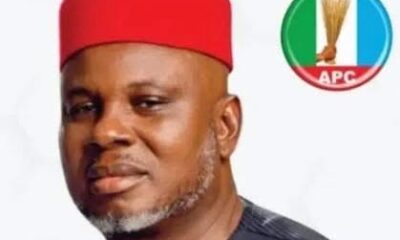

Fact-checker has falsified Ukachukwu’s claim to be the highest employer of labour at a point in Anambra.
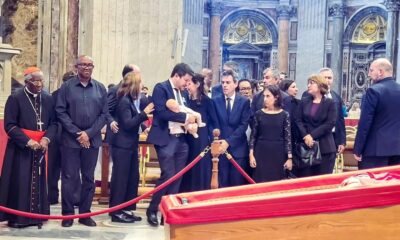

Peter Obi Pays Tribute: POPE FRANCIS EULOGY: Leaders Urged to Emulate Pontiff’s Values
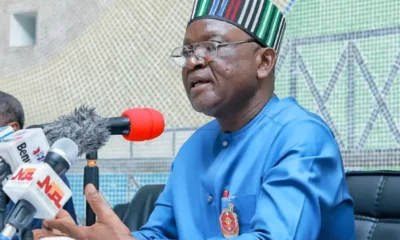

Benue Insecurity: Ortom cancels his 64th birthday celebration
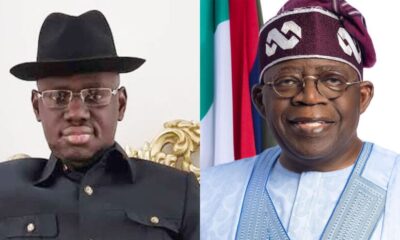

2027: Don’t fall for Tinubu’s tricks, Timi Frank warns Northern, Southern leaders
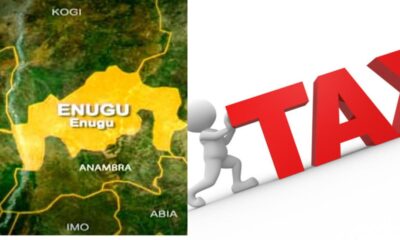

Taxing The Dead: Enugu State Government Faces Backlash For Imposing Mortuary Tax On Corpses
Politics
UPDATED: Oborevwori, Okowa, others dump PDP for APC
Published
1 hour agoon
April 23, 2025By
Ekwutos Blog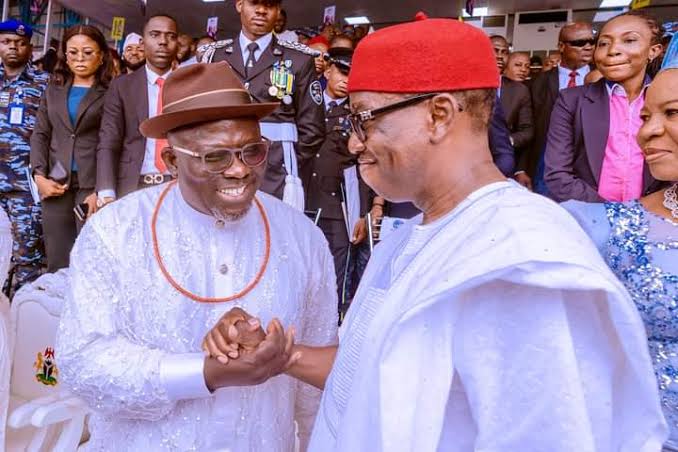
Delta State Governor, Sheriff Oborevwori, the immediate past governor, Ifeanyi Okowa, and all members of the Peoples Democratic Party in Delta State have defected to the All Progressives Congress.
The announcement was made on Wednesday in Asaba, the Delta State capital, by Senator James Manager, shortly after a meeting that lasted over six hours at Government House, Asaba.
Manager stated, “All PDP members in the state, including the governor, former Governor Okowa, the Speaker, the state party chairman, all the local government chairmen and others, have agreed to move to the APC.
“We cannot continue to be in a sinking boat,” he said.
The Delta State Commissioner for Information, Mr Aniagwu Charles, officially confirmed the governor’s defection and the collective decision of Delta PDP leaders and stakeholders to join the APC.
“
There is a need for us to adjust our drinking patterns. And in adjusting that drinking pattern, we needed to make a decision that would further help to cement the development in our state, to build the court of law that has existed in our state, to further advance the cause of security and the welfare of our people, and, to a large extent, ensure that development in Delta is not truncated,” Aniagwu stated.
He continued, “In taking that decision, we concluded that leaving the PDP was very necessary for us to be able to collaborate and build a state that every Deltan will be proud of. We believe that what is happening, and the state of the PDP, is akin to that palm wine whose taste has changed — and there was a need for us to change the drinking party.”
Charles added that the decision was unanimously made by party leaders and stakeholders, hinting at a formal public declaration soon.
“By the grace of God, on Monday next week, we will be able to make a very big statement confirming that we are moving into the APC,” he said.
The move marks a significant turning point in Delta State politics, signalling a broader political recalibration that could reshape party dominance in the South-South region.
Politics
2027: Don’t fall for Tinubu’s tricks, Timi Frank warns Northern, Southern leaders
Published
3 hours agoon
April 23, 2025By
Ekwutos Blog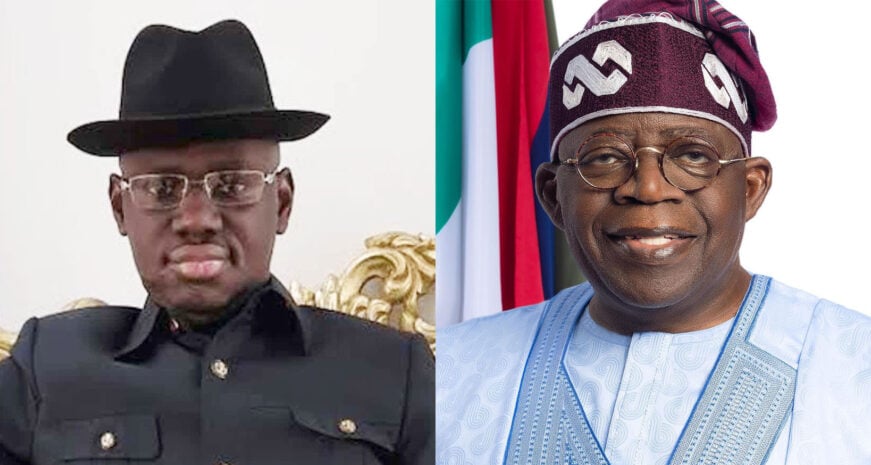
A former Deputy National Publicity Secretary of the All Progressives Congress (APC), Comrade Timi Frank, has warned northern and southern leaders against being fooled by President Bola Tinubu’s tricks to grab power in 2027.
Frank made the call in a statement issued Wednesday.
He said while Tinubu is on the one hand blackmailing southerners, especially opposition governors on the platform of the PDP, Labour Party and All Progressives Grand Alliance by playing the ethnic card to gain support, he is on the other hand threatening to deal with them if they fail to support him by declaring a state of emergency in their states.
Frank added that 2027 should not be about North or South but who would fix the myriads of challenges confronting the country.
He said: “He has increased the intensity now by blackmailing, intimidating and putting at least five PDP Governors from the South under duress to defect along with their Members in the National Assembly to the APC.
“To Tinubu, the 2027 election is about him versus the North and that is why he is trying desperately to enlist the support of the South through manipulation and subterfuge. He has forgotten so soon that the North helped him to get to power in 2023.
“Nigerians are in need of a President who will help Nigeria become better, not ‘Northern candidate or Southern candidate’ or ‘Northern President or Southern President’.
“The country is overcharged already with divisions along ethnic lines. We therefore can’t afford to have a President who is setting one region against another for the sake of his own personal ambition.
“For me, Timi Frank, as a Southerner, I don’t believe in tribalistic and a divisive president. I believe in a leader that will come and unite rather than divide Nigeria.
“I advise every Northerner still supporting Tinubu to have a rethink. They should know that the North that apparently ‘assisted’ Tinubu to gain power in 2023 are suffering the most today.
“It is a fact that the north has been grossly sidelined in appointments and other infrastructure development programmes by Tinubu who has prioritised his personal and tribal life interests over the everything else.”
“This is why the North should wake up. They should know this route Tinubu is going in terms of 2027 politics, is not the best for Nigeria. They should rise and speak with one voice in 2027.
“I want the Northern leaders to know that should Tinubu find his way back to power in 2027, the North will suffer untold neglect as Tinubu and the APC don’t have their genuine interest at heart.
“As we speak, at least five opposition governors are set to defect to APC not because they like Tinubu but due to intense political pressure, intimidation and blackmail, while those who will remain have been made to sign undertakings to deliver their states to Tinubu otherwise they will be made to lose their second terms elections.
Politics
150 PDP, LP members defect to APC in Enugu, back Utazi’s suspension
Published
6 hours agoon
April 23, 2025By
Ekwutos Blog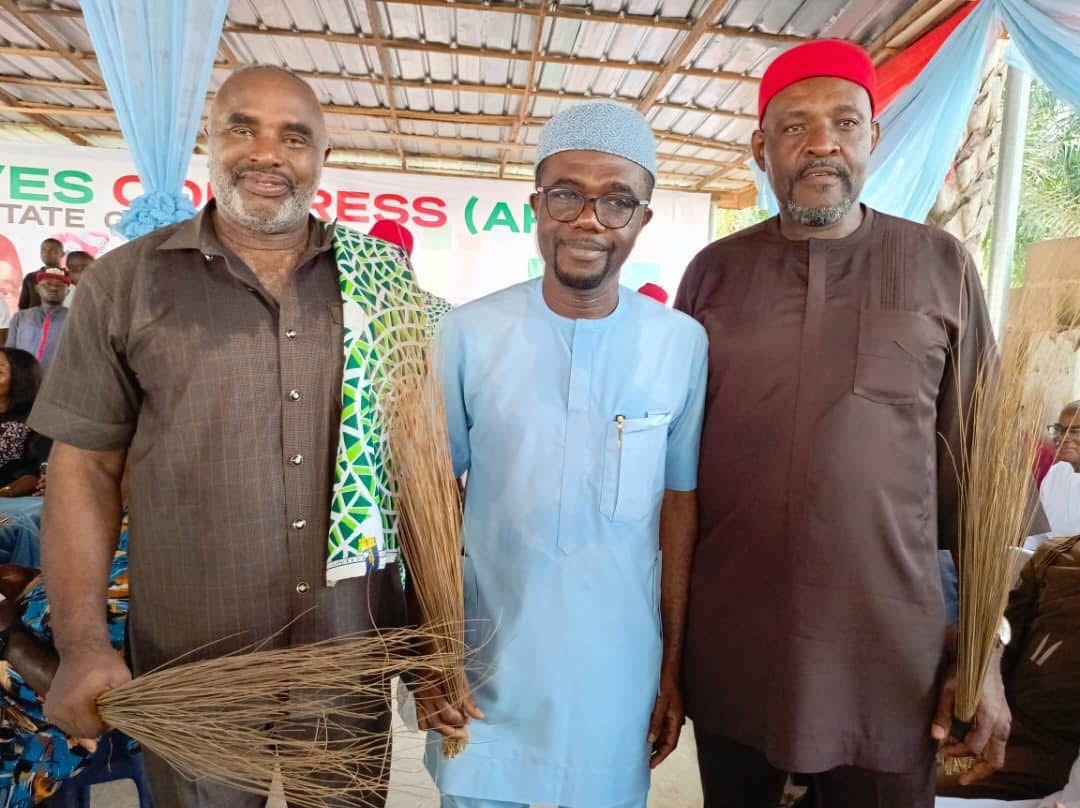
At least 150 members of the Peoples Democratic Party (PDP) and Labour Party (LP) have defected to the All Progressives Congress (APC) in Enugu State, strengthening the opposition party.
Prominent defectors include Peter Okonkwo, former Commissioner for Local Government; Nonso Ochi, LP’s 2023 Awgu North candidate; Onyeka Chukwuedo, PDP Awgu South aspirant; Chief John Edeh, PDP Nkanu West aspirant; Chief Tony Chigbo, former Uzo-Uwani LGA Chairman; and Emeka Abba, LP chieftain from Udenu.
The defectors were welcomed during an expanded stakeholders’ meeting at the APC’s state secretariat on Saturday. A communiqué stated, “The leaders note with excitement that our party has witnessed significant growth with the influx of new members in the last year. The number of new decampees that we received today is evidence of such an influx across the local government areas and wards.”
Stakeholders endorsed the indefinite suspension of Senator Chuka Utazi by his Nkpologu ward and Uzo-Uwani LGA for alleged anti-party activities, urging the State Executive Committee to ratify it
They accused the Peter Mbah-led government of failing to address killings in Uzo-Uwani and Isi-Uzo, stating, “The party declared that the Peter Mbah-led government has failed in its primary duty of protecting lives and property… the huge population of the citizens in the rural areas are left at the mercy of killer herdsmen and other criminals.”
The APC praised Minister Uche Nnaji for securing federal projects, jobs, and welfare packages, including Easter rice and 2024 farming fertilisers. They dismissed former chairman Ben Nwoye’s resignation, noting: “One cannot be resigning from a party that he or she is no longer a member of since 2023.”
The meeting reaffirmed loyalty to President Bola Tinubu’s Renewed Hope agenda, urging Igbo support.

UPDATED: Oborevwori, Okowa, others dump PDP for APC

Fact-checker has falsified Ukachukwu’s claim to be the highest employer of labour at a point in Anambra.

Peter Obi Pays Tribute: POPE FRANCIS EULOGY: Leaders Urged to Emulate Pontiff’s Values
Trending

 Trending6 months ago
Trending6 months agoNYA demands release of ‘abducted’ Imo chairman, preaches good governance
- Business6 months ago
US court acquits Air Peace boss, slams Mayfield $4000 fine

 Politics6 months ago
Politics6 months agoMexico’s new president causes concern just weeks before the US elections
- Entertainment6 months ago
Bobrisky transferred from Immigration to FCID, spends night behind bars
- Entertainment6 months ago
Bobrisky falls ill in police custody, rushed to hospital

 Politics6 months ago
Politics6 months agoRussia bans imports of agro-products from Kazakhstan after refusal to join BRICS

 Politics6 months ago
Politics6 months agoPutin invites 20 world leaders
- Politics1 year ago
Nigerian Senate passes Bill seeking the establishment of the South East Development Commission.

